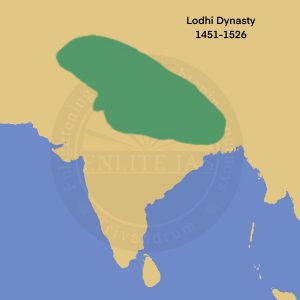Lodhi Empire (1451 – 1526 CE)
- The Ghizali tribe of Afghanistan founded the Lodi Empire.

Important Rulers:
Bahlol Lodhi (1451-1489 CE)
- Founder of the Lodi Dynasty.
- Malik Sultan Shah Lodi, the governor of Sirhind, Punjab, India, was his uncle and son-in-law.
- On April 19, 1451, Bahlul Lodi ascended to the throne of the Delhi Sultanate after the final Sayyid ruler of Delhi, Alauddin Alam Shah, voluntarily abdicated the crown in his favor.
- He endeavored to restore Delhi’s prestige by conquering Jaunpur, Rewail, Itawah, Mewar, and Gwalior. Jaunpur was his most important conquest.
- Bahlul Lodi won over Afghans by providing them with Jagir and treating them like friends.
- He died in 1489 CE. His son, Sikander Lodhi, succeeded to the throne after his death.
Sikander Lodhi (1489-1517 CE)
- Sikandar Khan Lodi, Bahlol’s second son succeeded him after his death on July 17, 1489, taking the title Sikandar Shah.
- He moved the capital from Delhi to Agra, built mosques, supported trade and commerce, was a renowned poet (writing under the pen name Gulruk), patronized education, and had Persian translations of Sanskrit medical texts.
- He curbed the individualistic tendencies of his Pashtun nobles by making them submit their accounts to state audit, which helped to instill vigor and discipline in the administration.
- His most notable accomplishment was the conquest and annexation of Bihar.
- Sikander Lodhi was an advocate for children’s education. He placed a scholar, a speaker, and an educator in charge of each mosque. Many scholarly books have been translated from Sanskrit to Persian.
- He was a patron of the arts, music, and writing. He adorned the city of Agra with colossal forts and buildings.
- Lahjat-I-Sikhander Shahi, a musical notation, was composed during his reign. Sikander Lodi died in 1517. His youngest son, Ibrahim Lodi, became the leader of the realm.
Ibrahim Lodhi (1517-1526 CE)
- Ibrahim Lodi was assisted by his nobility in becoming the Sultan.
- There were uprisings during his rule.
- Bihar proclaimed its independence.
- The Punjabi governor, Daulat Khan, also revolted. Sultan’s actions incited a great deal of discontent.
- Babur received an offer from Daulat Khan in Kabul to attack India.
- In the First Battle of Panipat in 1526 CE, Babur triumphed over Sultan Ibrahim Lodi.
Administration
- The goal of the Lodhi dynasty was to create and uphold a centralized government within the Delhi Sultanate.
- Their main objectives were to ensure effective governance, preserve law and order, and consolidate power.
- The empire was split up into provinces, each of which had a governor or wazir, an appointed official in charge. These administrators were in charge of keeping up local government, collecting taxes, and preserving the Sultan’s power.
- They worked to bolster and restructure the armed forces. To defend the empire against external threats, they kept standing armies and instituted reforms in the enlistment, training, and disposition of their soldiers.
Art and Architecture
- Lodhi Style of Architecture – The Lodi dynasty gave rise to a unique architectural style that became known as the “Pathan style” or “Lodhi style”. This architectural style blended Central Asian and Persian characteristics with pre-existing Indo-Islamic architectural elements. It used strong materials like brick and stone to highlight simplicity.
- Double domes – During their reign, they brought in a fresh style of double-domed Islamic architecture. Double domes are constructed from two layers: the outer layer serves as the building’s crown, while the inner layer serves as the internal ceiling. This method made it possible to put the interior ceiling lower and more proportionately to the area it covers. Such is the tomb of Sikandar Lodi, which is situated in Delhi’s Lodhi Gardens.
- Lodhi Garden – It is believed that Sultan Sikander Lodi commissioned the gardens in the late 15th century.
- The Lodi kings are well-known for building grandiose graves and mausoleums for themselves and their nobles. E.g. tomb of Sikandar Lodi in Delhi and the tomb of Ibrahim Lodi in Panipat.
Literature
- The Hindi language was developed and promoted during this time, making it a significant literary medium.
- Poetry and Sufi Literature: During the Lodi era, prominent poets and Sufi scholars emerged, producing significant literary works.
- Patronage of Scholars: The Lodi monarchs supported and encouraged scholars and thinkers.
Decline
- Revolts sprang out during Ibrahim Lodi’s reign. His own brother, Jalal Khan, rebelled; Sultan Ibrahim Lodi had him killed.
- Bihar declared independence. Daulat Khan, the Governor of Punjab, also rebelled. The Sultan’s behavior sparked widespread displeasure.
- Daulat Khan, the rebel leader, invited Babur to invade India from Kabul. In 1526, Babur defeated Sultan Ibrahim Lodi at the Battle of Panipat.
